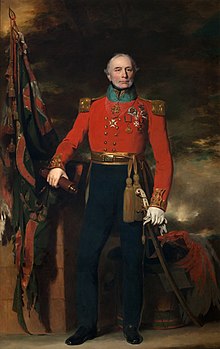Lieutenant-General Sir Neil Douglas KCB KCH (1779 – 1 September 1853) was a British Army officer who fought at the 1815 Battle of Waterloo and later became Commander-in-Chief, Scotland.
Sir Neil Douglas | |
|---|---|
 Sir Neil Douglas | |
| Born | 1779 Glasgow |
| Died | 1 September 1853 |
| Allegiance | |
| Service | |
| Rank | Lieutenant-General |
| Commands | Commander-in-Chief, Scotland |
| Battles / wars | Napoleonic Wars |
| Awards | Knight Commander of the Order of the Bath Knight Commander of the Royal Guelphic Order |
Life
editHe was born in Glasgow the fifth son of John Douglas a merchant and descendant of the Earls of Angus.[1]
Douglas was commissioned as a Second Lieutenant into the 95th Regiment of Foot on 28 January 1801.[2] Promoted to captain in the 79th Regiment of Foot on 19 April 1804, he took part in the Battle of Copenhagen in August 1807, the Battle of Corunna in January 1809 and Battle of Bussaco in September 1810 during the Napoleonic Wars.[2] In the last he was almost killed, being found on the battlefield with seven bayonet wounds but nevertheless surviving.[1]
In May 1813 he took command of the whole regiment in place of Lt Col Fulton. At the Battle of the Pyrenees he had his horse shot out from under him.[1]
He went on to fight in the Battle of Nivelle in November 1813, the Battle of the Nive in December 1813 and the Battle of Toulouse in April 1814.[2] Promoted to lieutenant-colonel on 3 December 1812, he commanded his regiment at the Battle of Quatre Bras in June 1815 and the Battle of Waterloo also in June 1815 during the Hundred Days.[2]
He served as Commander-in-Chief, Scotland[3][4] and also as Governor of Edinburgh Castle from 1842[5] to 1847 at the rank of Major General.[2]
Family
editIn 1816 he married Barbara Robertson, daughter of George Robertson, a banker in Greenock. They had a son, General Sir John Douglas of Glenfinart GCB (7 July 1817 – 8 September 1888), a British Army officer who became Commander-in-Chief, Scotland.[6] His nephew was Sir James Douglas, 1st Governor of British Columbia.[7]
References
edit- ^ a b c d "Lt General Sir Neil Douglas". Douglas History. Retrieved 5 February 2021.
- ^ a b c d e "Neil Douglas". Oxford Dictionary of National Biography (online ed.). Oxford University Press. 2004. doi:10.1093/ref:odnb/7913. Retrieved 29 October 2014. (Subscription or UK public library membership required.)
- ^ "Dalry Cemetery". Edinburgh City Council. Retrieved 29 November 2014.
- ^ The Gentleman's Magazine, Volume 174. 1843. p. 540.
- ^ "No. 20095". The London Gazette. 29 April 1842. p. 1172.
- ^ Great Britain. Army. Queen's Own Cameron Highlanders; Mackenzie, Thomas Arthur; Ewart, John Spencer; Jameson, Robert (1887). Historical records of the 79th Queen's Own Cameron Highlanders. University of California Libraries. London, Hamilton, Adams.
- ^ Handout: Sir James Douglas, Confederation Debates 1865-1949, British Columbia National Edition, University of Victoria, B. C., p. 298, Accessed February 8, 2024